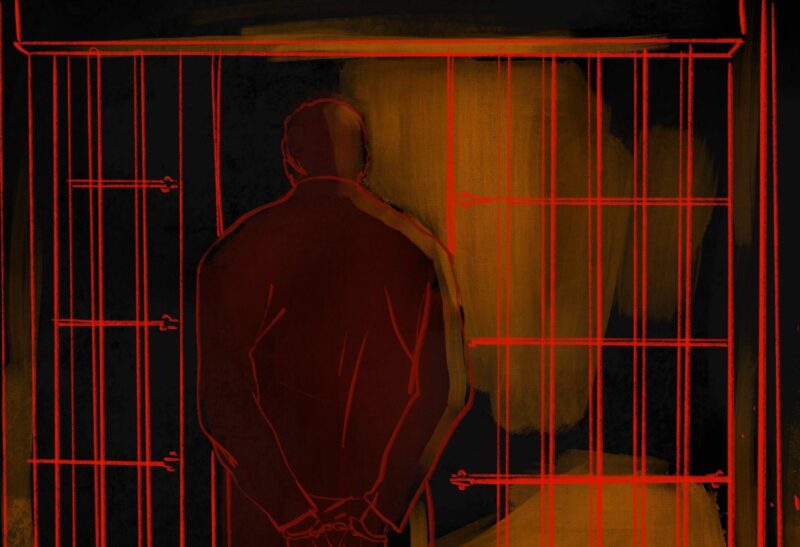
Several high-level company officials of Global Stone and mid-level government officials of the Binaqadi district were sentenced to hefty prison sentences on January 27, 2017, after being found guilty of neglect, violating fire-safety regulations and abuse of office, which resulted in a high-rise apartment fire in 2015, killing 15 and and injuring 50.
Prosecutors in the case argued that the fire was caused by poor-quality and highly flammable materials which were used in the insulation of the building. As a result, when the fire broke out it spread quickly and was difficult to extinguish in a timely manner.
A British expat working in the oil industry in Baku told Meydan TV the incident was bound to happen, and will happen again given what he says is inherent corruption in the construction industry.
“Buildings just keep on popping up all around the city, and you just know they’re cutting some corners”, the expat told Meydan TV.
According to reports from Transparency International, the Carnegie Endowment for Peace and the GAN Business Anti-Corruption Portal, Azerbaijan’s construction sector is one of the country’s most corrupt fields.
And the corruption runs deep, on both low-level corruption in obtaining permits to high-level corruption favoring allies of the presidential family in construction tenders.
Sarah Chayes of
the Carnegie Endowment for Peace explains
that Azerbaijan has a bribe-pooling system “whereby bribes and spurious fines extorted at street level are sent upward and pooled centrally, and then a portion is redistributed back down in the form of so-called envelope salaries” when it comes to petty corruption, but adds that “the networks are also horizontally integrated, especially into massive holding companies that are composed of subsidiaries in a variety of lucrative economic sectors”.
The construction industry is a highly profitable field, generating 11.7 per cent of the country’s GDP and employing 101,400 people in 2013.
And it shows, with three flame-like skyscrapers embedded on Baku’s skyline, the stretched- out boulevard with its one mini-Venice and luxury shopping malls including Valencia, Givenchy and Alexander McQueen.
As a result of the country’s major oil revenues after the Baku-Tbilisi-Ceyhan pipeline started operating in 2005 and the fastest growing economy worldwide from ‘05 to ‘07, infrastructure construction became a high priority for the government.
But the “once-booming city skyline is now blighted with half-finished buildings topped by idle cranes”, the
Washington Post writes about Baku
.
“Construction on the Trump International Hotel & Tower here in Azerbaijan’s capital stopped last year when the country’s oil-driven economy crashed amid plummeting oil prices”.
Another major, recent, example is the 2B Dollar Azerbaijan Tower, which was supposed to be the tallest building in the world, surpassing both the Burj Khalifa and the Jeddah Tower. The tower was supposed to be the centerpiece of the Khazar Islands, a $100 billion city of 41 man-made islands on 3,000 hectares in the Caspian Sea.
Construction works on the Islands and tower have stopped after Ibrahim Ibrahimov, the billionaire oligarch behind the project, was arrested in 2015 for “unpaid debts” and with the construction company being unable to pay for the continuation of the project.
And while the construction industry has been hit hard by economic downfall, the results of high-level corruption seeping through it for over a decade leaves it trails.
Azer Mehtiyev, director of the Center for Assistance to Economic Initiatives, a politically independent think tank, says the government has a major hand in almost all major infrastructure projects.
“Big infrastructure projects financed by oil revenues are mainly distributed to companies which belong to high-ranking officials. The government keeps the information about company owners secret. State contracts are assigned to companies established in offshore zones with unknown owners making public supervision over the process impossible”, Mehtiyev
told Radio Free Europe in 2012
.
Large holdings that do not face the problems of bribing officials are construction companies directly linked with the presidential family, such as DIA Holding, Pasha Construction (part of Pasha Holding), and Silk Way Construction. Other offshore companies, including Arbor Investments, LaBelleza Holdings, the Harvard Management Ltd., and the DDLAR Group, and which are largely
controlled by the Aliyev’s children and other senior officials, and have won major construction bids
.
And these are only the most visible, as the holding companies often have several subsidiaries, in different sectors, with construction and banking being extremely closely knit, the Carnegie report mentioned above states.
If you are not directly linked with the presidential family or high government officials, your projects will face significant construction delays, overspending and poor quality of work due to kickbacks and money laundering schemes
BTI’s transformation index reveals
.
“Not much gets built in Azerbaijan without a “kryscha” (Rus. roof), or protection provided by organized crime”,
Gregor Peter Schmitz writes
in Der Spiegel about construction in Azerbaijan.
However, it is not only high-level corruption that hurts the industry – construction permits are difficult to get unless you pay up, the
World Bank Doing Business Report 2013
stated.
An exemplary case is that of a regular Azerbaijani, Hikmet, who wanted to change his apartment into a flower shop, but was informally told that his construction permit would only be accepted if he paid up $10,000, an amount Hikmet definitely did not have.
Transparency Azerbaijan supported Hikmet
in a court case, and he did receive his permit in the end.
But courts themselves suffer from
corruption
, with judges accepting bribes for favorable verdicts, and not everyone has the support of international organizations.
With a consistently devaluating manat, big projects on the horizon constantly such as
White City Baku
being constantly prolonged and inherent corruption in the field, one has to wonder just how long it will take for stable and quality construction to become a reality in Baku.



